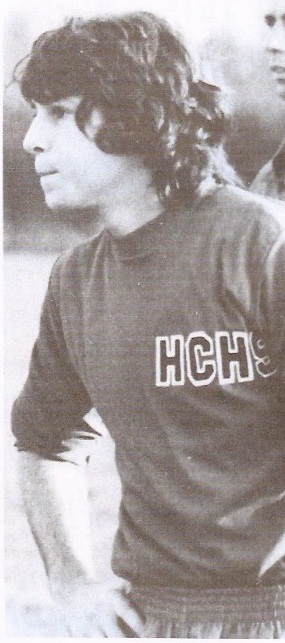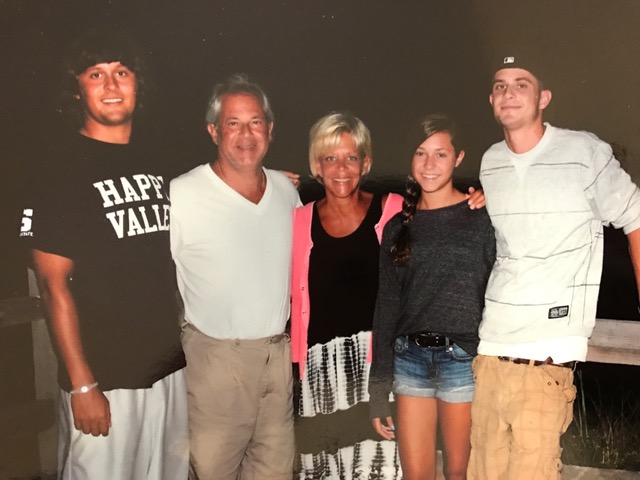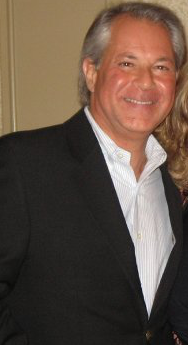Bob B. was a good student, star athlete and popular young man until a soccer injury in high school took most of his hearing. Too proud to admit his disability, Bob struggled through college, career and family life. He finally learned about cochlear implants but questioned them. His breaking point? When his hearing loss started to affect his family. Read Bob’s story and how he got himself back to being the confident, social man he was 23 years ago:
 “I lost the hearing in my right ear at the age of six because of an infection, so I went through life just like George Bailey in the movie ‘It’s a Wonderful Life.’ This wasn’t so bad except for an occasional teacher who might make me sit in the front of the classroom after seeing the results of a hearing test. No one really knew I had this ‘problem.’ I was popular, a good student, had girlfriends, excelled as an athlete and never missed a party, ever.
“I lost the hearing in my right ear at the age of six because of an infection, so I went through life just like George Bailey in the movie ‘It’s a Wonderful Life.’ This wasn’t so bad except for an occasional teacher who might make me sit in the front of the classroom after seeing the results of a hearing test. No one really knew I had this ‘problem.’ I was popular, a good student, had girlfriends, excelled as an athlete and never missed a party, ever.
That all changed opening night playing a high school soccer game my senior year. I was a star on the team and loved all the attention. During the game, I went up to ‘head’ a ball coming my way the same time as a kid on the other team. My head hit the ball just as he hit me running at full speed, his forehead bashing me just behind my left (good) ear. I hit the ground stunned but got up quick enough and stayed in the game. At the time I had very long, shoulder length hair, and our team wore bright red uniforms. I didn’t know I was bleeding from the ear until the bus ride home.
My ear stopped bleeding, but it hurt pretty badly and it was ‘ringing.’ I went to bed only to wake up early in the morning to find I couldn’t hear anything but this ‘ringing noise’ in my head. I stood up and fell face first on the floor. I had no balance, no hearing and I was never so scared.
I spent a few nights in a hospital. My balance was restored, as was about 50 percent of the hearing in my left (good) ear. I got a hearing aid for the first time. I went back to playing soccer, and I played the last two games of the season, but I was a shell of myself. Not aggressive, lacking confidence and not able to hear the ref’s whistle above the ringing in my head or my coaches calls from the sideline. That winter, I watched from the bleachers as my former wrestling teammates won the state championship without me. Needless to say, what should’ve been a great year, my senior year in high school, was the worst of my life.
College, career, family life – struggling for years
The ‘ringing’ never stopped. I spent the summer and every year after that visiting doctors and specialists in New York City and Philadelphia. I tried every type of hearing aid on the market: in the ear, behind the ear, the ‘Presidential’ (that President Ronald Reagan wore), the ‘crossover,’ etc.
To compensate for my tinnitus, I wore these hearing aids turned up to highest volumes I could stand, causing further nerve damage to my good ear, less and less verbal discrimination and/or the ability to hear high-pitched sounds. In an amazingly short time, I learned to read lips incredibly well. It was all I could do, and in later years it was the only way I could hold a conversation with people.
I ‘fudged’ my way through college, too proud to admit I had this problem. I wore my hair long to hide the hearing aids. Teachers would turn towards the blackboard or turn down lights for projected screen lessons, and, unable to see lips, I’d miss all that was said. I skipped classes with group discussions because I couldn’t follow along. Friends let me copy notes. Somehow, I was able to graduate. On a social level, I drank heavily for that boost of confidence necessary to go to all the parties on campus.
For many years, my speech patterns would get worse and worse. I was often made fun of, which hurt. People thought I was rude for ‘ignoring’ them. The mishaps, things people with normal hearing take for granted, became a regular and frustrating part of life. Missed announcements at airports, being detained at Customs for incorrectly answering questions, being the last out the door of a Las Vegas hotel with fire alarms blaring, being lost for hours in my car unable to call for directions, shoved against a wall and frisked by security for walking through metal detectors unaware that bells were going off.
Throughout my career, as people coping with a severe hearing loss understand, I’ve had to work so much harder than the ‘other guy.’ You’re minimizing phone use, you’re reading lips, you’re running from one face-to-face meeting to another, you’re checking and rechecking notes to make sure you got things right. You are writing messages and faxing things back and forth. I can tell you an eight-hour day for most people was a 10-12 hour day plus weekends for me. It was exhausting, and I missed a great deal of family time, but I did it to get ahead.
 At the age of 38, I could no longer use a phone with any confidence. I had an assistant that received and made calls for me. I stopped going to town hall meetings, Chamber of Commerce events and other important functions despite my status as a businessman in the community. My wife is one of nine children, and we’d get together often with her siblings, great, loud, fun-loving people. These visits, with such a crowd, were so difficult. I was becoming more and more withdrawn, wanting to do less and less socially.
At the age of 38, I could no longer use a phone with any confidence. I had an assistant that received and made calls for me. I stopped going to town hall meetings, Chamber of Commerce events and other important functions despite my status as a businessman in the community. My wife is one of nine children, and we’d get together often with her siblings, great, loud, fun-loving people. These visits, with such a crowd, were so difficult. I was becoming more and more withdrawn, wanting to do less and less socially.
That year, I met a guy who came up from Washington, D.C., to my New Jersey office to install a TTY phone. He was born nearly deaf, did not speak well, but turned out to be one of the brightest people I’ve ever met. He showed me how to use the phone, then I took him to dinner and he told me about cochlear implants.
From that night on, my wife, my dad, my assistant at work and I began researching ‘cochlear implants.’ We read all the reports and talked to everyone we could. But still, I wasn’t sure what it all meant for me.
That summer, I really struggled while coaching my two sons’ Little League baseball team. These eight and nine year olds had questions I could barely hear. Calling on parents with ‘rain-out’ dates and travel instructions was work. I was a sought after coach and I loved it, but it was so hard.
Then, one afternoon in the fall when my wife was out, my younger son’s football coach called with important information regarding an upcoming game. I got the instructions all wrong, and he wasn’t ready to play. I went to the coach and explained everything. That was the final straw.
I had nothing to lose to try something that might improve the lives of my family.
I met my surgeon, and he was sure that I would have a high chance of success with a cochlear implant. Well, I had the surgery, and the miracle of a successful cochlear implant and sound processor from Cochlear Americas became real.
I will never forget my second visit with my audiologist, mapping my sound processor. I heard my Dad’s ‘natural’ voice, so much different from an amplified voice heard with hearing aids, for the first time since that fateful soccer game 23 years ago!
On the way home, a Carole King song played on the radio and all the words came right back to me. You’d have to understand that, though I loved music as a kid, it was something that was gone from my life for decades.
I began using a regular telephone without attachments and scoring in the mid-nineties on hearing and speech discrimination tests in what was again my ‘good ear.’ My speech improved almost instantly. People would tell me this time and again.
Since receiving my cochlear implant, I’ve been elected to serve on industry boards, school boards and bank boards. I do a great deal of public speaking. I’m playing golf, something that wasn’t socially possible before. And, because I’ve had this stroke of luck, I’m determined to give back any way I can. I’ve been a mentor for so many Cochlear recipients, I’m a Special Olympics coach, and I manage fundraisers for charities. It’s all good.”
